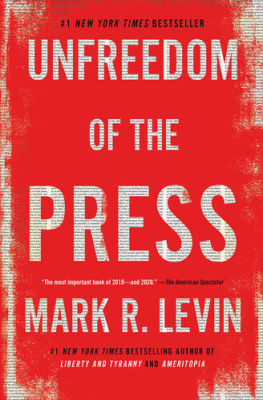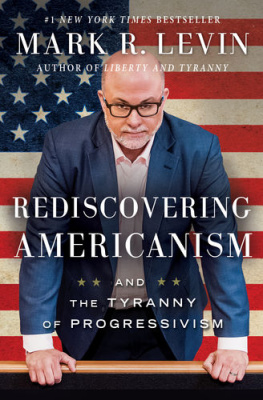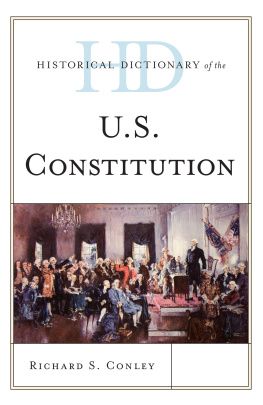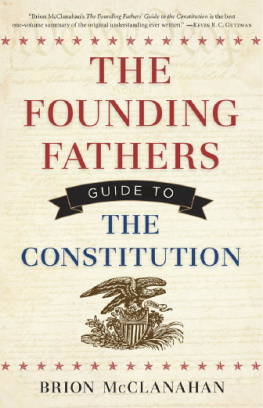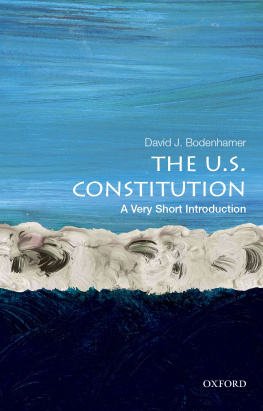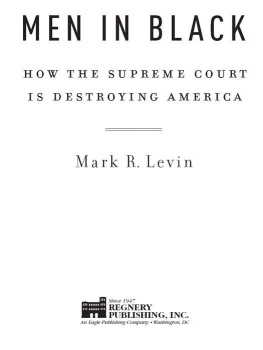Thank you for downloading this Threshold Editions eBook.
Join our mailing list and get updates on new releases, deals, bonus content and other great books from Threshold Editions and Simon & Schuster.
C LICK H ERE T O S IGN U P
or visit us online to sign up at
eBookNews.SimonandSchuster.com
CONTENTS
Restoring the American Republic
An Amendment to Establish Term Limits for Members of Congress
An Amendment to Restore the Senate
An Amendment to Establish Term Limits for Supreme Court Justices and Super-Majority Legislative Override
Two Amendments to Limit Federal Spending and Taxing
An Amendment to Limit the Federal Bureaucracy
An Amendment to Promote Free Enterprise
An Amendment to Protect Private Property
An Amendment to Grant the States Authority to Directly Amend the Constitution
An Amendment to Grant the States Authority to Check Congress
An Amendment to Protect the Vote
The Time for Action
The Amendments
To My Beloved Family and Fellow Countrymen
CHAPTER ONE
R ESTORING THE A MERICAN R EPUBLIC
I UNDERTOOK THIS PROJECT not because I believe the Constitution, as originally structured, is outdated and outmoded, thereby requiring modernization through amendments, but because of the opposite that is, the necessity and urgency of restoring constitutional republicanism and preserving the civil society from the growing authoritarianism of a federal Leviathan. This is not doomsaying or fearmongering but an acknowledgment of fact. The Statists have been successful in their century-long march to disfigure and mangle the constitutional order and undo the social compact. To disclaim the Statists campaign and aims is to imprudently ignore the inventions and schemes hatched and promoted openly by their philosophers, experts, and academics, and the coercive application of their designs on the citizenry by a delusional governing elite. Their handiwork is omnipresent, for all to seea centralized and consolidated government with a ubiquitous network of laws and rules actively suppressing individual initiative, self-interest, and success in the name of the greater good and on behalf of the larger community. Nearly all will be emasculated by it, including the inattentive, ambivalent, and disbelieving.
The nation has entered an age of post-constitutional soft tyranny . As French thinker and philosopher Alexis de Tocqueville explained presciently, It covers the surface of society with a network of small complicated rules, minute and uniform, through which the most original minds and the most energetic characters cannot penetrate, to rise above the crowd. The will of man is not shattered, but softened, bent, and guided; men are seldom forced by it to act, but they are constantly restrained from acting. Such a power does not destroy, but it prevents existence; it does not tyrannize, but it compresses, enervates, extinguishes, and stupefies a people, till each nation is reduced to nothing better than a flock of timid and industrious animals, of which the government is the shepherd.
Social engineering and central planning are imposed without end, since the governing masterminds, drunk with their own conceit and pomposity, have wild imaginations and infinite ideas for reshaping society and molding mans nature in search of the ever-elusive utopian paradise. Their clumsy experiments and infantile pursuits are not measured against any rational standard. Their piousness and sanctimony are justification enough.
Tocqueville observed further, It would seem as if the rulers of our time sought only to use men in order to make things great; I wish that they would try a little more to make great men; that they would set less value on the work and more upon the workman; that they would never forget that a nation cannot long remain
Today Congress operates not as the Framers intended, but in the shadows, where it dreams up its most notorious and oppressive laws, coming into the light only to trumpet the genius and earnestness of its goings-on and to enable members to cast their votes. The people are left lamebrained and dumbfounded about their representatives supposed good deeds, which usually take the form of omnibus bills numbering in hundreds if not thousands of pages, and utterly clueless about the effects these laws have on their lives. Of course, that is the point. The public is not to be informed but indoctrinated, manipulated, and misled.
Congress also, and often, delegates unconstitutionally law-making power to a gigantic yet ever-growing administrative state that, in turn, unleashes on society myriad regulations and rules at such a rapid rate the people cannot possibly know of them, eitherand if, by chance, they do, they cannot possibly comprehend them. Nonetheless, ignorance, which is widespread and deliberately so, is no excuse for noncompliance, for which the citizen is heavily fined and severely punished.
Not to be outdone, the current occupant of the Oval Office sees his primary duty as fundamentally transforming the United States of America.of the executive branch into an immense institution exercising a conglomeration of powers, including lawmaking and decreeing, is clearly without constitutional origin, a quaint notion mostly derided these days.
Having delegated broad lawmaking power to executive branch departments and agencies of its own creation, contravening the separation-of-powers doctrine, Congress now watches as the president inflates the congressional delegations even further and proclaims repeatedly the authority to rule by executive fiat in defiance of, or over the top of, the same Congress that sanctioned a domineering executive branch in the first place. Notwithstanding Congresss delinquency, but because of it, an unquenched President Obama, in a hurry to expedite a societal makeover, has repeatedly admonished Congress that [i]f [it] wont act soon to protect future generations, I will!that is, if Congress will not genuflect to his demands, and pass laws to his liking, he will act on his own.
And the president has made good on his refrain. On a growing list of matters, he has, in fact, displayed an impressive aptitude for imperial rule. With the help of a phalanx of policy czars, from immigration, the environment, and labor law to health care, welfare, and energy, the president has exercised his executive discretion to create new law, abrogate existing law, and generally contrive ways to exploit legal ambiguities as a means to his ends. He has also declared the Senate in recess when it was not, thereby bypassing the Senates constitutional advice and consent role to install several partisans in top federal posts.
Today this is glorified and glamorized as compassionate progressivism. The Framers called it despotism. In Federalist 48, James
The third branch of the federal triarchy, the judiciary, is no better. Among the biggest myths is that the men and women of the judiciary, operating under monklike conditions, would dutifully and faithfully focus their undivided mental faculties toward preserving the Constitution. They would apply their expertise, experience, and insight free from the political pressures and biases of elections and the legislative and executive branches of government, and within a narrow scope of authority and purpose. Moreover, it was assumed there was little to fear from this part of government. In Federalist 78, Alexander Hamilton explained, Whoever attentively considers the different departments of power must perceive, that, in a government in which they are separated from each other, the judiciary, from the nature of its functions, will always be the least dangerous to the political rights of the Constitution; because it will be least in a capacity to annoy or injure them. Yet, having seized for itself in the early years of the nation the final word on all matters before it, the Supreme Court with just five of its nine members can impose the most far-reaching and breathtaking rulings on the whole of society, for which there is no effective recourse.




